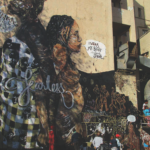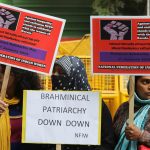Act against trolling, sexual harassment and abuse
Across the planet social media has been effectively exploited by the new set of authoritarian and often demagogic political leaders on the far right. Fake news is one important aspect of this.
Author:
11 March 2019

Across the planet social media has been effectively exploited by the new set of authoritarian and often demagogic political leaders on the far right. Fake news is one important aspect of this. Another is that from Turkey to India, Brazil, Hungary and the United States, female activists, politicians, academics and journalists have been subject to grossly sexist and intimidatory trolling.
Last month, a woman from Kolkata in India received an onslaught of death and rape threats after she criticised Narendra Modi’s government in a Facebook post following the Pulwama terror attack. She reported that most of the threats came from right-wing trolls.
In Pakistan a senator, Hafiz Hamdullah, called well-known journalist Marvi Sirmed a “whore” and threatened to strip her during a women’s rights debate on national television. He later blamed his outburst on Sirmed, saying that she had “provoked” him.
In Brazil, Bibiana Bolson, also a journalist, has reported repeated online rape threats to the police. In Porto Alegre another journalist, Renata Medeiros, was called “a whore” by a sports fan while reporting on a game.
Related article:
In South Africa fake news and organised trolling of journalists, sometimes accompanied by direct physical intimidation, became part of the tactics used by the forces acting in support of Jacob Zuma and the Gupta family. This included highly sexist attacks on female journalists.
The problem in South Africa, however, has not been contained to pro-Zuma forces. It has become systemic. As respected journalist Redi Tlhabi recently observed, “rejection of a woman journalist’s work that doesn’t end with threats of rape is rare”.
Last week Julius Malema, leader of the Economic Freedom Fighters (EFF), posted journalist Karima Brown’s phone number on twitter. She was subjected to an avalanche of racialised and sexist abuse, including rape and death threats. Malema refused to apologise although later, under pressure, he condemned the actions of his supporters.
This is not the first time that the EFF have attacked journalists, or that their attacks on journalists have taken a grossly sexist, crudely racialised and disturbingly abusive form. The South African National Editors Forum (Sanef) has approached the equality court to interdict both Malema and the party from intimidating, harassing, threatening or assaulting five named journalists who have all been subject to abuse after reporting critically on the party. Two of these five journalists, Ranjeni Munusamy and Pauli van Wyk, have been singled out as women and called “whores”, “witches”, “bitches”, and “cunts”. Calls have been made by EFF supporters for them to be raped and attacked. The matter is expected to be heard later this month.
Others have called for the Electoral Commission of South Africa (IEC) to determine whether Malema contravened the electoral code of conduct by publishing Brown’s personal information online.
Related article:
However, this is not a purely legal matter. It is also an ethical and political matter. Feminist academic Pumla Gqola writes that “The threat of rape is an effective way to remind women that they are not safe and that their bodies are not entirely theirs. It is an exercise that communicates that the man creating fear has power over the woman who is the target of his attention. It also teaches women who witness it about their vulnerability either through reminding them of their own previous fear or reminding them that it could happen to them next.”
We cannot allow sexist trolling to become a normalised feature of our society. It is an outrage and must be treated as such by all progressive forces.
The deliberate mobilisation of dishonesty in the form of “fake news”, which has often infected our media, and even some academic journals too, is also a serious threat to our democracy and to the prospects for rational debate. Journalists are often the subjects of dishonest claims.
Last year EFF spokesperson Mbuyiseni Ndlozi falsely accused veteran journalist Thandeka Gqubule and Wits journalism professor Anton Harber, both of whom were leading figures in the anti-apartheid press, of having been agents of the apartheid state. Ndlozi’s allegation was not just farcical. It was also dangerous, and carried significant intimidatory power.
According to Gender Links, cyber bullying is an emerging threat to female leaders. “Women in leadership positions specifically in politics, including those aspiring to be politicians, have been unduly targeted by online violence and have experienced the wrath of online abuse, threats and bullying. Compared to that of men, female online harassment is considered to be more racial, religious and sexual in nature”.
Last year, in collaboration with Gender Links, Sanef released the annual Glass Ceiling Survey. The survey identified cyber misogyny as a new threat against women, which includes “some of the ugliest forms of sexism being used to try and silence media women”. Online misogyny is frequently translated into harassment on the streets. Female journalists are increasingly reporting acts of verbal and physical harassment during protests and political rallies, or while out on their everyday business.
Despite this, there is systemic lack of concern for gender issues in South African party politics. When the Daily Maverick asked seven political parties to submit their sexual harassment policies, only two were able to do so.
Related article:
The 107-year-old ANC decided to adopt one only recently. Had it come sooner, former ANC MP Mduduzi Manana – convicted of three counts of assault with intent to do grievous bodily harm in September 2017 – could have been kicked out of the party immediately. But the rot runs deeper than a failure to develop appropriate policies. The ANC Women’s League conducted itself shamefully during Jacob Zuma’s rape trial, chanting for Manana, the former deputy minister of higher education, outside the courtroom.
In 2017, the DA terminated the membership of its former Eastern Cape chief whip Edmund van Vuuren, who was found guilty of sexual harassment of a staff member. The complainant, a 26-year-old woman, accused Van Vuuren of making inappropriate comments. A panel of the Federal Legal Commission (FLC) found Van Vuuren guilty of sexual harassment and recommended that he be removed as chief whip and have his DA party membership suspended until 2019.
Sexual harassment at its most extreme leads to rape. In 2017/2018, the South African Police Service recorded 40 035 rape cases. According to Africa Check this is an average of 110 rapes recorded daily. But as is widely accepted, only a small fraction of rapes are reported to the police, who themselves are accused of committing gendered violence and abuse.
Related article:
As Gqola writes: “We know that today women do not feel safe in the streets and homes of South Africa, that women’s bodies are seen as accessible for consumption, touching, raping, kidnapping, commenting on, grabbing, twisting, beating, burning, maiming and control, that women are denied the very freedom that ‘empowerment’ suggests, the very freedom the Constitution protects.’’
She is right. Women do fear. And every time that a political leader or party gives their supporters explicit or tacit approval to publicly harass another woman online or in the street what Gqola calls “the female fear factory” is worsened. In the words of the old trade union slogan, “An injury to one is an injury to all”.
Silence is complicity. We all need to take a clear and public stand against the normalisation of gendered harassment and abuse in our politics – and in our daily lives.




![2 August 2018: “I decided to kill myself because when my last-born experiences what I had been experiencing, [it] was [a] torture ... I couldn’t withstand…”](https://www.newframe.org/wp-content/uploads/2019/04/image-24-442-150x150.jpg)